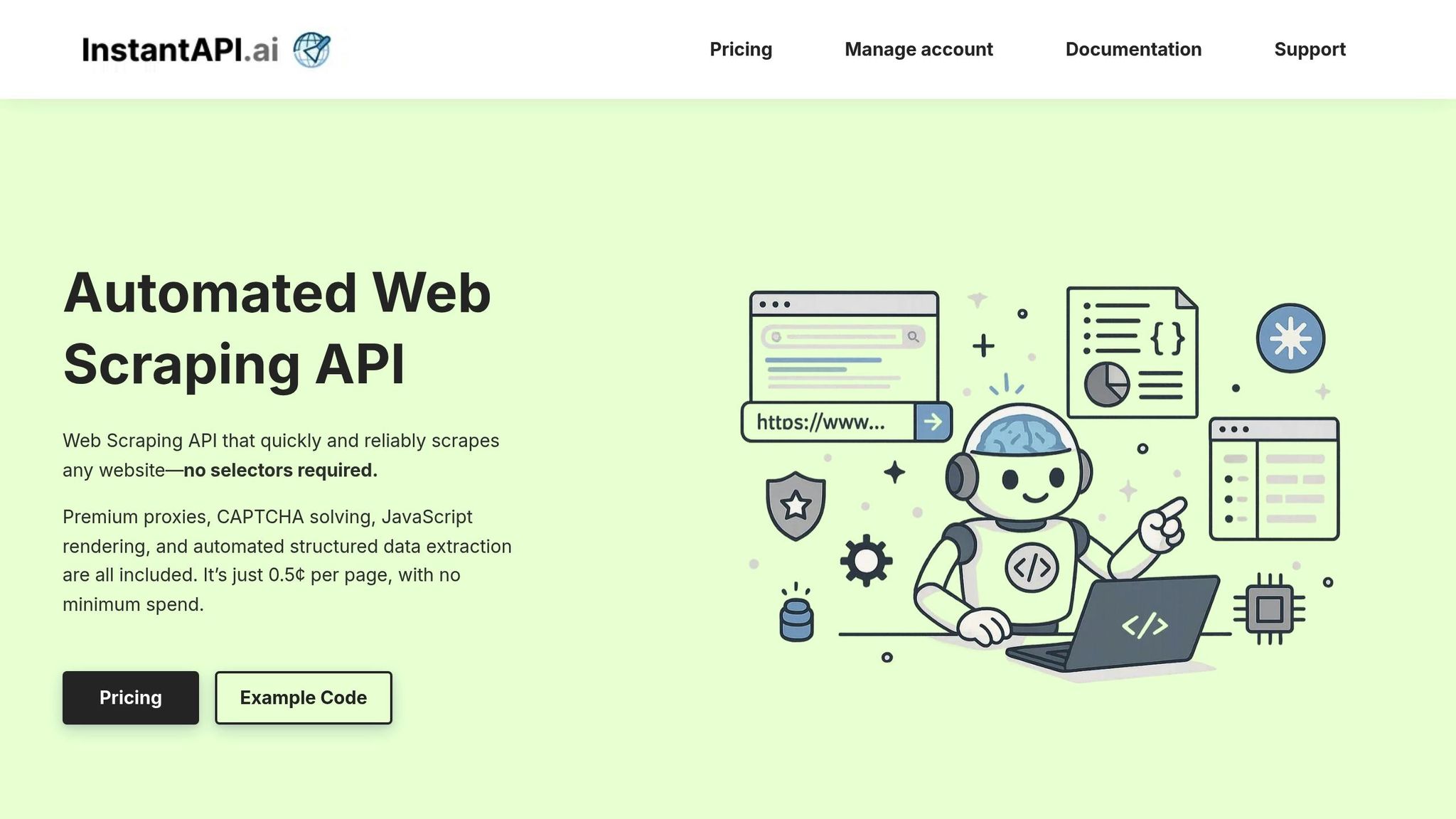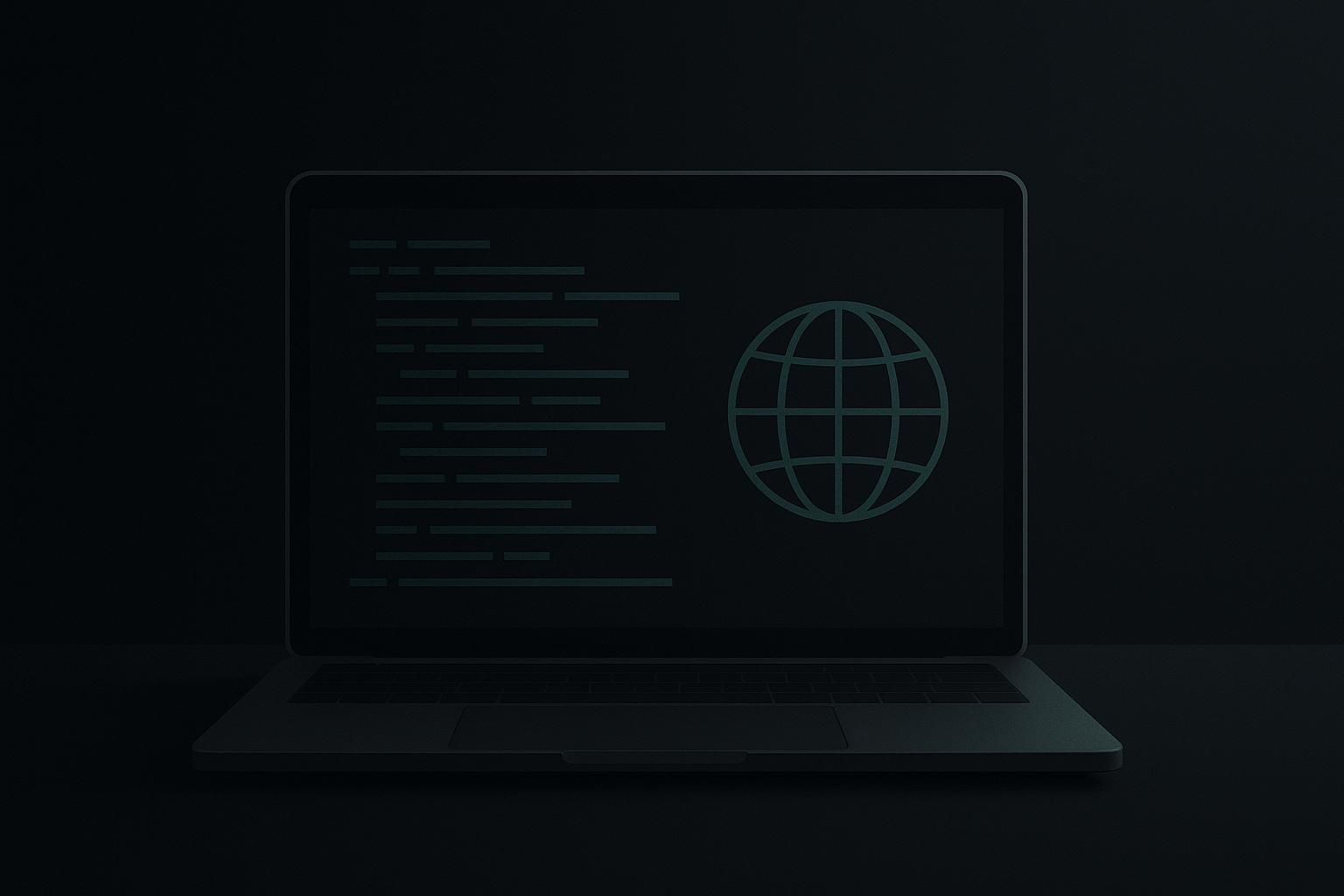Web scraping helps hospitality businesses like hotels, restaurants, and travel agencies gather and analyze online data to make smarter decisions. Here's how it works and why it matters:
- Track Competitor Prices: Adjust room rates and stay competitive by monitoring prices on booking platforms.
- Analyze Customer Feedback: Use reviews to improve service quality and address guest concerns.
- Predict Trends: Gather data on market demand, local events, and seasonal patterns for better planning.
- Understand Customer Preferences: Study social media and review profiles to tailor marketing and services.
Key Benefits of Web Scraping:
- Automates data collection, saving time and reducing errors.
- Provides real-time insights for pricing, marketing, and resource allocation.
- Helps businesses deliver personalized guest experiences.
For example, Marriott used these techniques in 2023 to cut check-in wait times by 25% and boost positive reviews by 15%. With tools like InstantAPI.ai, which costs just $0.005 per page, businesses can collect and use data efficiently while following legal and ethical guidelines.
How to scrape hotel data, prices, and listings with Booking ...
Web Scraping Uses in Hospitality
Web scraping automates the collection of online data, turning it into actionable insights for hospitality businesses. This approach is particularly useful in three key areas: pricing, customer reviews, and market research.
Price Monitoring and Adjustment
Web scraping helps track competitor pricing across booking platforms, allowing businesses to adjust their rates strategically. By analyzing data in real time, properties can fine-tune their pricing based on factors like:
| Factor | Data Source | Impact on Business |
|---|---|---|
| Market Demand | Booking Platforms | Adjust rates higher during busy periods |
| Competitor Rates | Hotel Websites | Stay competitive by matching or beating prices |
| Local Events | Event Calendars | Charge premium rates during high-demand events |
This data-driven approach ensures properties remain competitive and maximize revenue opportunities.
Customer Review Analysis
Web scraping gathers guest feedback from review sites, helping businesses pinpoint areas for improvement. For instance, Hotel Giraffe by Library Hotel Collection used sentiment analysis on scraped reviews and discovered 97% positive feedback compared to just 1% negative. Tools like NLP libraries help categorize reviews, offering insights into areas such as cleanliness, staff performance, and other service elements.
Market Research and Customer Insights
Web scraping also enhances market research by uncovering customer preferences and industry trends. Hospitality businesses can analyze data to:
- Understand customer demographics from review profiles for targeted marketing
- Examine competitor services to identify gaps in offerings
- Discover SEO keywords from online content to improve search visibility
- Monitor social media sentiment to gauge brand perception
By analyzing this data, hotels and restaurants can deliver tailored guest experiences, adapt to emerging trends, and refine their services to meet customer expectations.
[1] Global hospitality market valued at approximately USD 3,953 billion in 2021 [2] Sentiment analysis results for Hotel Giraffe by Library Hotel Collection (97.2% positive, 1.22% negative)
Web Scraping Tools for Hospitality
Key Web Scraping Tool Requirements
| Requirement | Description | Priority |
|---|---|---|
| Worldwide Geotargeting | Access to global market data | High |
| Custom Data Output | Extract tailored information | High |
| Parallel Requests | Collect data in real time | Medium |
| JavaScript Rendering | Access dynamic website content | High |
| CAPTCHA Handling | Ensure uninterrupted workflows | Medium |
Parallel requests help track prices in real time, while JavaScript rendering ensures you can gather complete review data from dynamic websites.
InstantAPI.ai Overview

One tool that checks these boxes is InstantAPI.ai:
InstantAPI.ai specializes in web scraping for the hospitality industry, offering services at just $0.005 per page. It handles even complex data extraction tasks with a high success rate.
"InstantAPI.ai's API is fast, easy, and lets us focus on our core features." - Juan, Scalista GmbH
The platform provides features like custom JSON outputs, automated pagination, built-in proxy management, and real-time data extraction.
With the right tools covered, the next step is understanding the legal and ethical aspects of web scraping.
[1] InstantAPI.ai pricing information.
[2] Customer testimonial from Juan, Scalista GmbH.
sbb-itb-f2fbbd7
Legal and Ethical Guidelines
U.S. regulations outline what data hospitality businesses can collect and how they should handle it.
Key U.S. Regulations
- Computer Fraud and Abuse Act (CFAA): A 2021 Ninth Circuit ruling clarified that scraping public data does not violate CFAA[1].
- Copyright laws: Fair-use defenses apply when dealing with proprietary content.
- California Consumer Privacy Act (CCPA): Protects California residents' personal data and enforces specific rights.
| Data Type | Legal Considerations | Actions |
|---|---|---|
| Public website content | Exempt from CFAA per Ninth Circuit[1] | Follow site terms |
| California residents' personal data | Covered by CCPA | Ensure compliance |
| Copyrighted material | Limited by fair-use rules | Conduct fair-use analysis |
Responsible Scraping Methods
- Always review the terms of service for target websites.
- Limit request frequency to avoid overwhelming servers.
- Avoid scraping login-protected or paywalled content unless explicitly authorized.
- Seek legal advice for unclear situations.
Once the data is collected, you can integrate it into your systems for further analysis and decision-making.
[1] U.S. Ninth Circuit Court of Appeals decision, 2021
Using Scraped Data Effectively
Business System Integration
Once you've ethically gathered your data, store it in a centralized database. This allows you to support various departments like sales, marketing, HR, and revenue planning more efficiently.
Here’s what you can do with properly integrated systems:
- Update pricing automatically based on competitor rate changes.
- Track customer sentiment trends by analyzing aggregated reviews.
- Set up alerts for market changes that could impact your business.
- Tailor marketing campaigns by leveraging customer demographics and preferences.
Data Analysis and AI Processing
Turn your centralized data into actionable insights using analytics and AI tools. Here’s a breakdown of how different types of analysis can help:
| Analysis Type | Business Impact | Key Metrics |
|---|---|---|
| Sentiment Analysis | Improve service quality | Trends in customer reviews |
| Demand Forecasting | Optimize resources | Seasonal booking patterns |
| Competitive Intelligence | Adjust pricing strategy | Competitor pricing and market data |
| Customer Segmentation | Offer personalized deals | Demographic and preference profiles |
US Data Format Standards
To ensure consistency, convert all scraped data into standard U.S. formats. Here's a quick guide:
| Data Type | US Format | Example |
|---|---|---|
| Dates | MM/DD/YYYY | 04/24/2025 |
| Times | 12-hour clock | 10:00 AM |
| Currency | USD with cents | $99.99 |
| Numbers | Comma separator | 1,000.00 |
| Temperature | Fahrenheit | 72°F |
Conclusion
Web scraping has proven its impact: Marriott International's March 2023 initiative reduced check-in wait times by 25% and increased positive check-in reviews by 15% within three months [1]. This example highlights how insights from price monitoring, review analysis, and market research can lead to measurable improvements.
These tools empower businesses to implement dynamic pricing, conduct sentiment analysis, forecast seasonal trends, and execute targeted marketing campaigns. Using a dependable API solution ensures smooth integration of data into your systems, helping hospitality businesses turn raw data into meaningful outcomes.
[1] Marriott International Internal Report, 2023
FAQs
What legal and ethical practices should hospitality businesses follow when using web scraping?
Hospitality businesses must follow key legal and ethical practices when using web scraping to ensure compliance and responsible data collection. Always respect website rules, such as adhering to robots.txt files and terms of service, and use APIs when available. To avoid overloading servers, implement delays between requests.
Focus solely on collecting publicly available data, and never gather personal or sensitive information. Any data collected should be securely stored and encrypted to protect it from unauthorized access. Additionally, businesses should establish clear data collection policies and maintain transparency about their scraping activities to build trust and uphold ethical standards.
How can hospitality businesses use web-scraped data to improve their services?
Hospitality businesses can use web-scraped data to gain valuable insights by organizing and analyzing information such as customer reviews, competitor pricing, and market trends. By storing this data in a centralized system or database, businesses can identify patterns, track changes in consumer preferences, and adjust their strategies accordingly.
For example, analyzing competitor pricing data can help optimize room rates, while customer reviews can highlight areas for improvement in service quality. To ensure success, it’s essential to focus on actionable insights that align with your business goals and to handle data responsibly while adhering to ethical and legal standards.
How does web scraping help hospitality businesses improve customer experiences?
Web scraping empowers hospitality businesses to deliver better customer experiences by providing actionable insights. For example, analyzing customer reviews helps businesses identify areas for improvement, tailor services to guest preferences, and address common pain points.
Additionally, businesses can monitor competitor pricing to adjust their own rates, ensuring they remain competitive while offering the best value to customers. Web scraping also aids in identifying fake or spam reviews, ensuring feedback remains authentic and trustworthy, which builds customer confidence.


